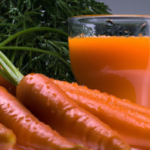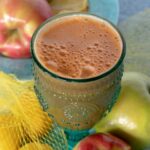I really enjoy making carrot juice! It’s not only a fantastic way to get all the essential nutrients and vitamins my body needs, but it also tastes delicious. One thing I keep wondering about is the shelf life of carrot juice.
I don’t want to waste my precious juice, so I did some research to find out the answer. Carrot juice is a popular choice for juicing because of its nutritional content, including high levels of vitamin A and beta-carotene. But like any fresh juice, it has a limited shelf life.
The shelf life of carrot juice depends on several factors, including how it’s stored, when it was made, and what other ingredients were added. In this article, we’ll explore these factors in more detail and answer the question of how long carrot juice can last.
Key Takeaways
- Cold-pressed carrot juice lasts longer than heat-treated juice.
- Refrigeration below 41°F is key to preserving freshness, with cold-pressed juice lasting up to 72 hours in the fridge.
- Freezing can preserve freshness for up to 8 months.
- Signs of spoilage include mold, sour smell, cloudy appearance, color changes, and sedimentation.
Factors that Affect the Shelf Life of Carrot Juice
You’ll want to pay attention to a few factors that can impact how long your carrot juice stays fresh. One of the biggest factors affecting oxidation is contact with oxygen, which can cause the juice to spoil quickly. To prevent oxidation, it’s best to consume your carrot juice as soon as possible after it’s been made.
Another factor that can impact the shelf life of carrot juice is the way it’s made. Cold pressed juice tends to last longer than juice made using heat or other methods. This is because cold pressed juice is made by slowly pressing the juice out of the carrots, which helps to preserve the nutrients and enzymes in the juice.
As a result, cold pressed carrot juice can last up to 72 hours in the fridge. But if you’re looking to get the most out of your carrot juice, it’s best to consume it within the first 24-48 hours for optimal freshness and maximum benefits.
When it comes to how long carrot juice can last, it ultimately depends on a few different factors.
How Long Can Carrot Juice Last?
Oops! Looks like I forgot about that carrot juice I made a week ago. Time flies when you’re having fun, but unfortunately, my neglected juice won’t be so fun to drink now. If you’re wondering how long carrot juice lasts, the answer depends on the storage and preservation methods used. Here are some things to keep in mind: Fresh homemade carrot juice typically lasts 3-5 days in the refrigerator if stored in an airtight container. Freezing can extend its life for a few months, but it’s always best to check for any off smells or flavors before consuming. In contrast, certain store-bought beverages, like canned pineapple juice shelf life, can last much longer thanks to preservatives and proper sealing techniques. Similarly, bottled juices, especially those with added preservatives, tend to have a longer shelf life compared to fresh homemade versions. However, the **bottled juice shelf life after opening** is usually reduced to 7-10 days when kept refrigerated, so it’s still important to consume it within that timeframe. Always check for any signs of spoilage, such as changes in color, smell, or taste, before drinking.
-
Refrigeration is key. Carrot juice can last up to 5 days in the fridge, but it’s important to store it at a temperature below 41°F (5°C) to prevent bacterial growth.
-
Freezing is an option. If you have more carrot juice than you can consume within a few days, freezing is a great way to preserve its freshness. Carrot juice can be frozen for up to 8 months, but be sure to leave some room in the container as the juice will expand when frozen.
-
Avoid exposure to air. Once opened, carrot juice should be consumed within 24 hours. Exposure to air can cause oxidation, which can lead to a loss of nutrients and an off taste.
Taking these steps can help extend the shelf life of carrot juice and preserve its freshness. However, if you notice any signs of spoilage such as a sour smell, mold growth, or a cloudy appearance, it’s time to dispose of the juice and make a fresh batch.
Signs of Spoilage
When it comes to making fresh carrot juice, it’s important to know when it’s gone bad and is no longer safe to drink. As someone who juices regularly, I always keep an eye out for visual indicators like mold or discoloration, as well as checking for any off-putting smells or tastes.
Safety concerns are also a top priority when it comes to consuming fresh juice, so it’s crucial to know the signs of spoilage and err on the side of caution if in doubt.
Visual Indicators
If you’ve made carrot juice, you can tell if it’s still fresh by looking for any changes in color or texture. Fresh carrot juice should have a vibrant orange color and a smooth, consistent texture. If you notice any discoloration or sedimentation, it’s a sign that the juice is no longer fresh and may have started to spoil.
Color changes are the most obvious visual indicator of carrot juice freshness and quality. As carrot juice ages, it may start to turn a darker shade of orange or even brown. This is due to oxidation, which causes the carotenoids in the juice to break down and lose their vibrant color.
Sedimentation is another common sign of spoilage. If you notice any bits of carrot or pulp settling at the bottom of the container, it’s a sign that the juice may have started to separate and break down. It’s important to discard any juice that shows these signs of spoilage to avoid consuming it and potentially getting sick.
Moving on to the next section about smell and taste, it’s also important to pay attention to these sensory indicators when evaluating the freshness of carrot juice.
Smell and Taste
To evaluate the freshness of your carrot juice, you should smell and taste it. Carrot juice has a distinct aroma that can differ from its flavor. The aroma of carrot juice can be earthy, sweet, and slightly nutty, while its flavor can be slightly sweet with a hint of bitterness.
It’s important to note that the aroma and flavor of carrot juice can be affected by various factors, including the processing method used. The impact of processing on the smell of carrot juice is significant. For example, if the juice is pasteurized, it may have a cooked or slightly burnt aroma. On the other hand, if the juice is freshly made, it will have a more vibrant and fresh aroma.
When it comes to taste, a bad smell can affect the overall flavor of the juice. Therefore, smelling and tasting the juice is crucial to ensure that it’s still fresh and safe to consume. With that said, let’s now move on to the safety concerns regarding carrot juice.
Safety Concerns
Now, you may be feeling anxious about drinking carrot juice due to safety concerns. Raw consumption of carrot juice is generally safe as long as it’s made from fresh, clean, and high-quality carrots.
However, there are some safety concerns that you need to consider if you’re planning to consume carrot juice that’s been pasteurized. Pasteurization methods involve heating the juice to a specific temperature to kill harmful bacteria and extend shelf life.
While this process can make the juice safer to drink, it also destroys some of the nutrients and enzymes in the juice that are beneficial for health. Additionally, pasteurized carrot juice may contain added preservatives, which can have adverse effects on some people.
To ensure the safety and quality of your carrot juice, it’s best to read the label and choose a product that’s free from harmful additives and preservatives.
When it comes to drinking carrot juice, safety is paramount. To mitigate any potential risks, it’s important to understand the difference between raw and pasteurized juice, and how each method can affect the quality and safety of the juice.
In the next section, we’ll discuss how to properly store carrot juice to prevent spoilage and maintain its freshness.
How to Properly Store Carrot Juice
Storing your carrot juice is like tucking in a sleeping baby; gentle and careful handling is crucial for its longevity. To keep your carrot juice fresh for a longer period, it’s essential to store it in a proper container and refrigerate it immediately.
A glass container with an airtight lid is the best option for storing carrot juice. Plastic containers aren’t recommended as they can leach harmful chemicals into the juice. After pouring the juice into the container, ensure it’s tightly sealed. Label it with the date of preparation to keep track of its freshness.
It’s also important to refrigerate the juice at a temperature below 40 degrees Fahrenheit. If the juice is left at room temperature or exposed to sunlight, it’ll spoil quickly. Following these storage guidelines will help extend the shelf life of your carrot juice and keep it fresh for a longer period.
Now that we know how to properly store carrot juice, let’s explore some tips for extending its shelf life even further.
Tips for Extending the Shelf Life of Carrot Juice
You’ll love these simple tricks for keeping your delicious carrot juice fresher for even longer.
One of the best ways to prevent spoilage is by storing it in an airtight container in the refrigerator. Oxygen is one of the main culprits when it comes to spoiling juice, so limiting its exposure can significantly extend the shelf life of your carrot juice. Glass containers are also preferred over plastic, as they don’t contain any harmful chemicals that can seep into the juice.
Another trick to keep your carrot juice fresh is to add a bit of lemon juice or vinegar to it. The acidity of these ingredients helps to prevent the growth of bacteria and mold, which can cause spoilage.
Lastly, it’s important to consume your carrot juice within 3-4 days of juicing it. While it can last up to a week in the refrigerator, its nutritional value begins to decrease after the first few days.
Now, let’s talk about the health benefits of carrot juice.
Health Benefits of Carrot Juice
I absolutely love drinking carrot juice because it’s packed with nutrients that are good for my body. Not only does it taste sweet, but it also boosts my immune system and promotes digestion. Carrot juice is rich in vitamins A, C, and K, as well as potassium and fiber.
It’s a great addition to my daily diet.
Rich in Nutrients
Carrot juice is a powerhouse of nutrients, providing a refreshing burst of vitamins and minerals with every sip. As someone who regularly drinks carrot juice, I can attest to the numerous benefits it has on my overall health and wellbeing. Here are just a few reasons why carrot juice is so rich in nutrients:
- Carrots are known for their high levels of beta-carotene, which our bodies convert into Vitamin A. This nutrient is essential for maintaining healthy skin, eyes, and immune function.
- This vitamin is crucial for blood clotting, bone health, and heart health. Drinking carrot juice regularly can help boost your Vitamin K levels.
- Carrots are a great source of potassium, which helps regulate blood pressure and supports healthy muscle and nerve function.
- Though carrot juice lacks the fiber found in whole carrots, it still contains some fiber which can help aid in digestion.
- Carrot juice is full of antioxidants which help protect our cells from damage caused by free radicals, reducing the risk of chronic diseases such as cancer and heart disease.
Drinking carrot juice regularly has numerous benefits, and the best time to drink it is in the morning on an empty stomach.
Now, let’s move on to how carrot juice can boost your immunity.
Boosts Immunity
Drinking carrot juice regularly can significantly strengthen your immune system, helping you fight off illnesses and infections. Carrots are rich in antioxidants, vitamins, and minerals that aid in the proper functioning of the immune system. One of the main antioxidants present in carrot juice is beta-carotene, which is converted into vitamin A in the body. Vitamin A plays a crucial role in the development and maintenance of the immune system. It helps in the production of white blood cells, which are responsible for fighting off harmful pathogens.
Apart from boosting immunity, carrot juice has several other benefits. It can be used in various recipes such as smoothies, soups, and salads. The table below lists some of the recipes that use carrot juice as a primary ingredient.
| Recipe Name | Ingredients | Method |
|---|---|---|
| Carrot Ginger Soup | Carrot juice, ginger, onion, garlic, vegetable broth | Sauté onion and garlic. Add carrot juice, ginger, and broth. Simmer for 15-20 mins. Blend and serve. |
| Carrot Orange Smoothie | Carrot juice, orange juice, banana, honey | Blend all ingredients until smooth. Serve chilled. |
| Carrot Salad | Carrot juice, shredded carrots, raisins, walnuts, honey mustard dressing | Mix all ingredients in a bowl. Serve chilled. |
In addition to these recipes, carrot juice can also aid in digestion, which we will discuss in the next section.
Promotes Digestion
After learning about how carrot juice can boost our immunity, let’s now dive into its benefits for digestion.
Drinking carrot juice regularly can promote a healthy digestive system. The soluble and insoluble fiber in carrots can help regulate bowel movements and prevent constipation. Moreover, the antioxidants in carrots can help reduce inflammation in the gut, which can lead to improved digestion and nutrient absorption.
But the benefits of carrot juice go beyond digestion. Carrots are rich in vitamins A and C, which can help improve skin health, boost the immune system, and promote eye health. Plus, carrot juice can be a great alternative for picky eaters who struggle to eat their vegetables.
Mixing carrot juice with other fruits and vegetables can create delicious and nutrient-packed smoothies or juices.
As we move on to the next section, we’ll explore the nutritional value of carrots and how they can benefit our overall health.
Nutritional Value of Carrots
You’re probably wondering why you should care about the nutritional value of carrots. Well, for starters, carrots are packed with vitamins and minerals that are essential for maintaining good health.
They are an excellent source of vitamin A, which is important for eye health, as well as vitamin K, which helps with blood clotting.
In addition, carrots contain significant amounts of potassium, fiber, and antioxidants, all of which contribute to overall well-being.
Carrots can be enjoyed in a variety of ways, from eating them raw as a snack to incorporating them into carrot juice recipes.
One of the health benefits of carrots is that they can help reduce the risk of chronic diseases such as heart disease and cancer. So, adding carrots to your diet is a great idea, especially if you’re looking to improve your health in the long term.
With that in mind, let’s move on to the next topic and learn how to make carrot juice.
How to Make Carrot Juice
So, if you’re wondering how to make carrot juice, let me break it down for you.
First, you’ll need a juicer or a blender.
Then, you’ll need to prepare your carrots by washing them thoroughly and chopping them into small pieces.
Finally, you’ll have to decide whether you want to blend or juice your carrots–each method producing a slightly different result.
Let’s dive into the details!
Equipment Needed
To make fresh carrot juice, all you need is a juicer and some carrots. However, to ensure the longevity of your juicer and to maintain its efficacy, it’s essential to keep it clean and well-maintained. Here are some tips to keep your juicer in tip-top shape:
-
Always read the manufacturer’s instructions before using your juicer for the first time.
-
Disassemble the juicer completely before cleaning it.
-
Use a brush to remove any pulp or debris stuck in the crevices of the juicer.
-
Soak the detachable parts in warm, soapy water for a few minutes before scrubbing them clean.
Keeping your juicer in good condition is important to ensure that it performs optimally and produces high-quality, nutrient-rich carrot juice.
Once you’ve cleaned your juicer, you can move on to the next step of preparing the carrots.
Preparation Steps
First, it’s important to wash and peel the carrots before juicing them, as studies show that the majority of pesticide residue is found on the outer layer of carrots.
Once the carrots are prepped, they can be juiced using a juicing machine or blender. The resulting carrot juice may vary in taste and color depending on the type of carrot used, the freshness of the carrots, and the juicing method.
Freshly made carrot juice is best consumed immediately after juicing to maximize its nutritional benefits. However, if you don’t have the time to drink it right away, it can be stored in an airtight container in the refrigerator for up to 24 hours. Just keep in mind that the longer it sits, the more the color and flavor may change.
With this in mind, let’s move on to the next section about blending vs. juicing.
Blending vs. Juicing
You might be wondering which method to use for making your carrot drink – blending or juicing – and it’s important to choose the right one to get the most out of your ingredients and achieve the flavor and texture you desire.
Here are some benefits and drawbacks to consider:
-
Blending benefits: Blending carrots with other fruits and vegetables can create a smoothie-like texture that many people prefer. It also retains more fiber and nutrients since the ingredients aren’t separated.
-
Juicing drawbacks: Juicing tends to remove fiber and can result in a thinner, less filling drink. However, it does allow for easier absorption of nutrients since the juice is already broken down.
Ultimately, the method you choose will depend on your texture preferences and nutrient retention priorities.
Now that you have a better understanding of blending and juicing techniques, let’s explore some creative ways to enjoy your carrot juice.
Creative Ways to Enjoy Carrot Juice
I love to experiment with different ways to enjoy my carrot juice. One of my favorite methods is mixing it with other juices, such as apple or ginger.
I also enjoy adding spices and herbs like cinnamon or ginger to give it an extra kick. And when I’m feeling adventurous, I use carrot juice as an ingredient in recipes like smoothies or salad dressings.
Mixing with Other Juices
Mixing carrot juice with other juices is like creating a rainbow explosion in your mouth. The flavor combinations are endless and can provide a variety of health benefits.
For example, adding apple juice to carrot juice can increase the antioxidant content and improve digestion. Mixing carrot juice with beet juice can help lower blood pressure and improve liver function. Combining carrot juice with orange juice can increase Vitamin C intake and boost the immune system.
Not only do these mixtures taste great, but they can also provide a well-rounded nutrient profile. Carrot juice is high in Vitamin A and beta-carotene, while other juices may contain different vitamins and minerals.
Experimenting with different juice combinations can help you find the perfect balance of flavors and nutrients. In the next section, we’ll explore how adding spices and herbs can take your carrot juice to the next level.
Adding Spices and Herbs
Sprinkling cinnamon or ginger into your carrot juice can give it a warm, cozy flavor perfect for fall mornings. But did you know that adding spices and herbs to your carrot juice not only enhances its taste but also provides health benefits?
Here are some spice combinations that you can try:
-
Cinnamon and nutmeg: Cinnamon is a natural anti-inflammatory and anti-oxidant that can help regulate blood sugar levels and lower the risk of heart disease. Nutmeg, on the other hand, has anti-inflammatory properties that can help alleviate pain and improve digestion.
-
Ginger and turmeric: Ginger is well-known for its anti-inflammatory and anti-nausea properties. It can also help improve digestion and lower cholesterol levels. Turmeric, on the other hand, is a powerful anti-inflammatory and anti-oxidant that can help reduce the risk of chronic diseases such as cancer, Alzheimer’s, and heart disease.
-
Mint and parsley: Adding mint and parsley to your carrot juice can give it a refreshing taste and provide a host of health benefits. Mint can help improve digestion and relieve nausea, while parsley is a natural diuretic that can help flush out toxins from the body.
Adding spices and herbs to your carrot juice is a simple and effective way to enhance its taste and boost its nutritional value.
In the next section, we’ll explore how you can use carrot juice in recipes to make healthy and delicious meals.
Using in Recipes
Now that we’ve discussed adding spices and herbs to carrot juice, let’s talk about incorporating this healthy beverage into recipes. As someone who enjoys experimenting in the kitchen, I’ve been pleasantly surprised by how versatile carrot juice can be.
It can be used in everything from cocktails to baked goods, adding a new dimension of flavor and nutrition. One unique way to use carrot juice is in cocktails. Its sweet and slightly earthy flavor pairs well with a variety of spirits, such as vodka or gin.
For example, you could mix carrot juice with fresh lime juice, honey, and gin for a refreshing twist on a classic gimlet. You could also blend carrot juice with orange juice and tequila for a tasty margarita alternative. The possibilities are endless, and experimenting with different combinations can lead to some delicious and unexpected results.
Another way to incorporate carrot juice into your cooking is by using it in baked goods. Carrot cake is already a classic dessert, but why stop there? You can use carrot juice to add moisture and flavor to muffins, bread, and even pancakes.
Simply substitute some of the liquid in your recipe with carrot juice and see how it transforms the final product. Not only will you be adding more nutrients to your baked goods, but you’ll also be pleasantly surprised by the unique taste.
So next time you’re looking for a new ingredient to add to your recipes, consider reaching for a bottle of carrot juice.
Frequently Asked Questions
Is it safe to consume carrot juice after the expiration date?
I would not recommend consuming expired carrot juice due to possible contaminants and the effects of improper storage. These can lead to foodborne illnesses and decreased nutritional value. Always check expiration dates and store juice properly.
Can carrot juice be frozen for longer storage?
Freezing carrot juice is a great way to extend its shelf life. Not only does it preserve the benefits of drinking carrot juice, but it opens up new possibilities for recipes and delicious carrot juice blends.
Does the type of carrot used impact the shelf life of the juice?
The type of carrot used can impact the nutritional benefits of the juice but not necessarily the shelf life. Some varieties may have higher levels of certain vitamins or minerals, but proper storage and handling are key for extending shelf life.
Can carrot juice be mixed with other juices for longer storage?
Juice combinations can extend the shelf life of carrot juice. Adding citrus fruits like lemon and orange can help preserve the juice for up to 2 days. This mix also enhances nutritional benefits with added vitamin C.
Can carrot juice be consumed by individuals with certain medical conditions?
As someone with diabetes or high blood pressure, it’s important to consider the sugar and sodium content in carrot juice before consuming it. This science-based approach ensures you make informed choices about your health.
Conclusion
Carrot juice is a delicious and healthy beverage that can provide numerous health benefits. However, it’s important to properly store and monitor its shelf life to ensure its freshness and safety.
As I sip my glass of fresh carrot juice, I can’t help but think of it as a ray of sunshine in a bottle, brightening up my day and nourishing my body.
By following the tips for proper storage and extending the shelf life of carrot juice, you can enjoy its full nutritional value for up to a week. Don’t let spoilage ruin the goodness of this vibrant drink. With a little care and attention, you can savor the taste and benefits of carrot juice for days to come.
So go ahead, grab your juicer and enjoy the sunshine in a glass.
Susannah expertise lies in researching and compiling evidence-based content on juicing, nutrition, and overall health. She is committed to ensuring that The Juicery World offers accurate, up-to-date, and trustworthy information to empower readers to take control of their health. Susannah’s goal is to inspire individuals to embrace juicing as a way to nourish their bodies and live their best lives.

















